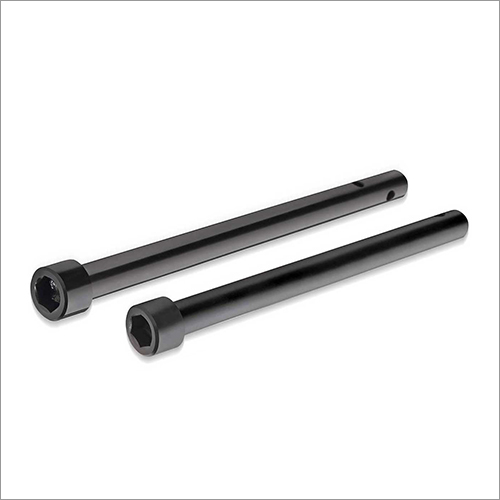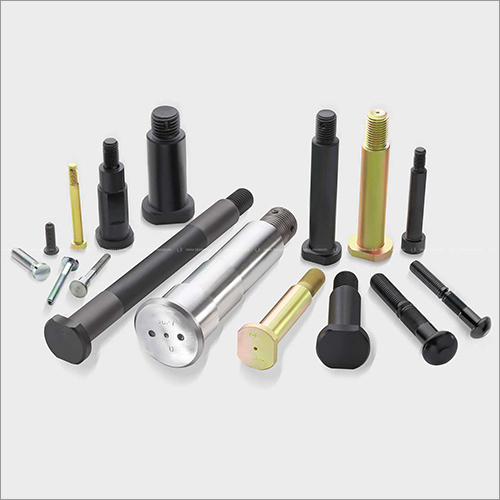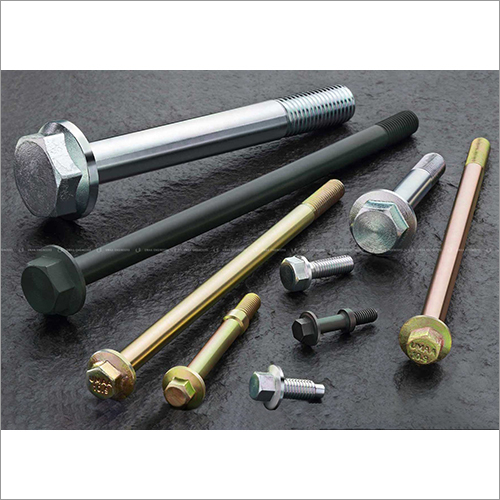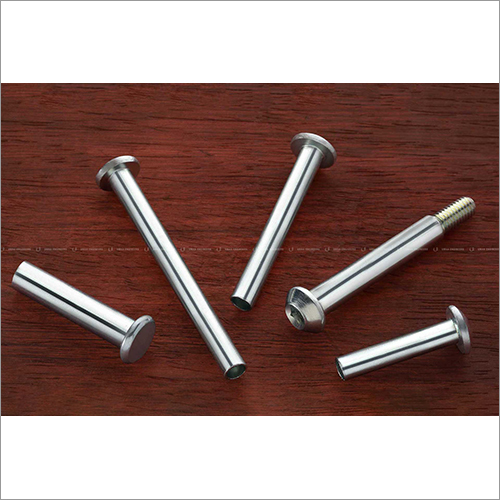Call : +919841020086
Call : +919841051422
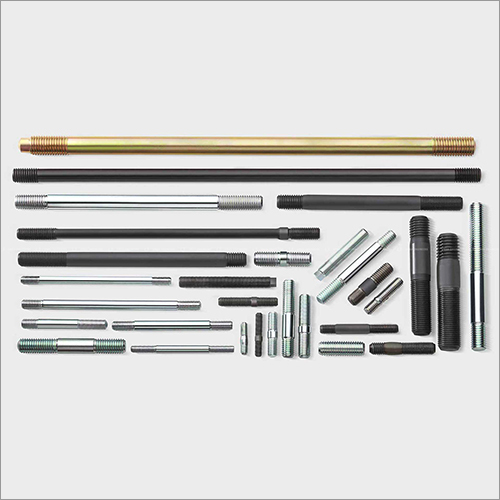
Industrial High Tensile Studs
100-1000 INR/Unit
Product Details:
- Usage Industrial, Automobile
- Product Type High Tensile Studs
- Material Stainless Steel
- Click to view more
X
Industrial High Tensile Studs Price And Quantity
- 100-1000 INR/Unit
- 500 Unit
Industrial High Tensile Studs Product Specifications
- High Tensile Studs
- Stainless Steel
- Industrial, Automobile
Industrial High Tensile Studs Trade Information
- 10000 Unit Per Day
- 1 Week
- All India
Product Description
Owing to paid growth in the industry, we are providing a distinct range of Industrial High Tensile Studs. These are avail from us at a larger quaintly to our clients. These studs are famous for its high strength and long lasting finishing. These products are used for high-stress fastening applications. They are help to secure heavy objects together in a reliable manner. They will not crack easily due to tension forces from your engine's operation.
Applications of High Tensile Stud:
High tensile studs are specialized fasteners designed to withstand high levels of tensile stress, making them ideal for a range of applications where strong and reliable connections are required. Some common applications of high tensile studs include:
1. Structural Engineering: High tensile studs are often used in construction and structural engineering projects where they provide a secure and durable connection between structural members such as steel beams, columns, and joints.
2. Automotive Industry: High tensile studs are used in the automotive industry for various applications, such as connecting engine components, exhaust systems, and suspension parts. Their strength and reliability are crucial for ensuring vehicle safety and performance.
3. Oil and Gas Industry: In the oil and gas sector, high tensile studs are used to connect critical components in pipelines, valves, flanges, and other high-pressure systems. These studs can withstand the extreme pressures and conditions encountered in the industry.
4. Aerospace and Aviation: High tensile studs play a vital role in the aerospace and aviation industry, where lightweight but strong fasteners are essential for securing components in aircraft, spacecraft, and related equipment.
5. Manufacturing and Heavy Machinery: High tensile studs are used in the assembly of heavy machinery, industrial equipment, and manufacturing systems where strong and reliable connections are necessary for safety and efficiency.
6. Offshore and Marine Applications: Offshore structures and marine vessels rely on high tensile studs to secure components in saltwater environments, where corrosion resistance and high strength are critical.
7. Renewable Energy: Wind turbines, solar power systems, and other renewable energy installations use high tensile studs to maintain the structural integrity of components subjected to wind and environmental forces.
8. Power Generation: In power plants and energy generation facilities, high tensile studs are used to connect components in boilers, turbines, and other high-temperature, high-pressure systems.
9. Rail and Transportation: High tensile studs are used in railway and transportation infrastructure for connecting tracks, bridges, and other critical components where safety and reliability are paramount.
10. Mining and Heavy Equipment: The mining industry relies on high tensile studs to secure equipment and machinery used in the extraction and processing of minerals. These fasteners can withstand the harsh conditions of mining operations.
11. Infrastructure Projects: High tensile studs are used in various infrastructure projects, including bridges, tunnels, and dams, where they provide robust connections to ensure the structural integrity and safety of these large-scale constructions.
12. Agricultural Machinery: In the agriculture sector, high tensile studs are used in the assembly of farm machinery and equipment, such as tractors and plows, to ensure their durability and performance.
Frequently Asked Questions:
Q. What is a high tensile stud?
Ans: A high tensile stud is a type of threaded fastener designed to provide a strong and reliable connection between two or more components. These studs are manufactured from materials with high tensile strength and are used in applications where the ability to withstand significant tensile stress is crucial.
Q. What materials are high tensile studs made from?
Ans: High tensile studs are typically made from materials like alloy steel, stainless steel, or other high-strength alloys. These materials offer the necessary tensile strength to withstand heavy loads and high-stress conditions.
Q. What are the different grades of high tensile studs?
Ans: High tensile studs are often classified into different grades based on their tensile strength. Common grades include Grade 8.8, Grade 10.9, and Grade 12.9. These grades indicate the stud's minimum tensile strength in megapascals (MPa).
Q. How do I choose the right high tensile stud for my application?
Ans: The choice of a high tensile stud depends on the specific requirements of your application, including the level of tensile strength needed and the environmental conditions. Consult with an engineer or fastener supplier to ensure you select the appropriate grade and material.
Q. What applications are high tensile studs suitable for?
Ans: High tensile studs are suitable for a wide range of applications, including structural engineering, automotive, oil and gas, aerospace, manufacturing, and more. They are used in any application where a strong and durable fastener is required.
Q. Do high tensile studs come in different sizes and thread types?
Ans: Yes, high tensile studs are available in various sizes and thread types to accommodate different applications. It's important to select the correct size and thread type to ensure a proper fit.
Q. What is the difference between a stud and a bolt?
Ans: A stud is a fastener with threads on both ends, designed to be screwed into a tapped hole in one component while the other component is secured with a nut. A bolt, on the other hand, has a head and threads on one end, typically used to pass through a hole in one component and secured with a nut on the other side.
Q. Are high tensile studs resistant to corrosion?
Ans: The resistance to corrosion depends on the material and coating of the high tensile stud. Stainless steel studs, for example, offer good corrosion resistance, while alloy steel studs may require additional coatings or plating to prevent corrosion in corrosive environments.
Q. Can high tensile studs be reused?
Ans: High tensile studs can be reused if they are not damaged and meet the required specifications. However, it's essential to inspect them for any signs of wear or damage before reuse.
Q. Do high tensile studs need to be torqued to a specific level?
Ans: Yes, it's crucial to torque high tensile studs to a specific level to ensure proper clamping force and prevent overloading. Follow the manufacturer's recommendations and engineering guidelines for torque specifications.
Q. Can high tensile studs be heat-treated for increased strength?
Ans: Some high tensile studs, especially those made from alloy steel, may undergo heat treatment processes to enhance their strength and durability. This should be done by professionals who understand the material properties and heat treatment procedures.
Enter Buying Requirement Details
Other Products in 'High Tensile Fasteners' category
We export our products in UK, South Asia, European countries.
 |
UMAA ENGINEERS
All Rights Reserved.(Terms of Use) Developed and Managed by Infocom Network Private Limited. |

